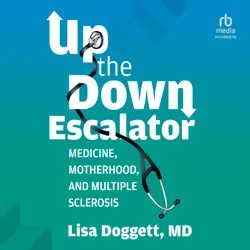A memoir of triumph in the face of a terrifying diagnosis, Up the Down Escalator recounts Dr. Lisa Doggett’s startling shift from doctor to patient, as she learns to live with multiple sclerosis while running a clinic for uninsured patients in central Austin. Recounting before and after the discovery of her MS, she chronicles vexing symptoms while trying to be an attentive mother, wife, and a caring family doctor.
2024 Gold Winner, Benjamin Franklin Awards, Health & Fitness Category
2024 Silver Winner, Nautilus Book Awards, Medical Memoir Category
2024 Best of Austin in Austin Chronicle Readers Poll, Nonfiction Writer Category 2024 Winner
2024 International Book Awards, Winner, Autobiography/Memoir Category and Health: Women's Health Category
2024 International Book Awards, Finalist, Parenting and Family Category and Women's Issues/Women's Studies Category
2023 Finalist, IAN Book of the Year Awards, Non-Fiction: Health/Medicine/Fitness/Dieting Category
Facing the prospect of a career-ending disability as she adjusts to life with multiple sclerosis, Dr. Lisa Doggett is forced to deal with a new level of uncertainty and vulnerability, and the everyday fear that something new will go wrong. Taking off her white coat—becoming a patient herself—she confronts unimaginable fears, copes with her limitations, and sidesteps her skepticism of alternative medicine to seek help from unlikely sources. Drawing on riveting patient stories, Doggett reveals the dark realities of the dysfunctional U.S. healthcare system, made all the more stark when she becomes the one seeking care.
MS pushes Doggett—a perfectionist at heart—to soften her inner drill sergeant and embrace self-compassion. As a patient, she learns to advocate for herself to ensure on-time medication deliveries and satisfactory treatment plans; to navigate chronic dizziness, relapses, and parenting frustrations; and to push her physical limits as a runner to go farther than ever before. As the director of a health clinic for the uninsured, Doggett’s MS inspires an even deeper empathy as she confronts challenging cases, prompting her to work harder on behalf of those in her care, many of whom struggle with illnesses more serious than her own.
This hopeful and uplifting book will encourage those living with chronic disease, and those supporting them, to power forward with courage and grace. It will spark conversations to redefine perfect parenting and trigger uncomfortable discussions and outrage about the vicious inequalities of health care in the U.S. Most of all, it will inspire readers to embrace the gifts of an imperfect life and look for silver linings, despite life’s detours that sabotage plans and take them off their expected paths.


